- Home
- John Triptych
A World Darkly (Wrath of the Old Gods Book 3) Page 4
A World Darkly (Wrath of the Old Gods Book 3) Read online
Page 4
People called it the Second Flower War. It was a ritualized form of killing and capturing. Instead of guns, people began to fashion melee weapons made from obsidian and wood- the macuahuitl, the preferred ancient sword of the Aztecs. The toughest began to wear nothing but feathered headdresses and loincloths, telling everyone that their gods would protect them in battle. Fifteen separate factions exploded in open warfare, the Lords of the Night fought against the Lords of the Day. Of course, there were many gods who were worshipped in both nights and days, and so they were able to achieve a significant advantage over their rivals. Warriors who were not killed outright were sacrificed in order to hasten the gods return. Within days, two powerful factions achieved dominance over the others. The most significant turning point in the war was when the followers of the war god Huitzilopochtli negotiated an alliance with the followers of Xipe Totec. In the succeeding days, their combined armies defeated all the others in major battles all across the city. Their most significant victory was in wiping out the followers of Tezcatlipoca, the god of the smoking mirror. When the last high priest of Tezcatlipoca was sacrificed, it was the end of that particular faction. The only other gods that were powerful enough to threaten their alliance would have been Tlaloc the rain god and Quetzalcoatl. The followers of Huitzilopochtli and Xipe Totec were able to appease the followers of Tlaloc by decreeing an equal amount of sacrifices, and the construction of a temple in his name. As for Quetzalcoatl’s followers, there were none. For some strange reason, the feathered serpent god never manifested itself in the thoughts of the people, unlike the other gods. By the time the Flower War had ended, most of the people in the valley were now worshippers of the god of war and the god of harvests.
A day after the end of the war, an even more miraculous thing happened. The center of Mexico City was torn apart by a series of massive earthquakes that reached all the way up to northern California. When the people woke up the next day, the Metropolitan Cathedral, the largest church in the Americas, had been completely swallowed up by the earth. Something gargantuan now stood in its place. As the people looked up, they saw two massive Aztec pyramids rising up hundreds of feet into the dark sky. They were made of black obsidian and had massive steps leading upwards that were carved from volcanic basalt. The people instantly rejoiced at the two new temples. It was from this point that a new class of people began to rule over the newly resurgent Aztec Empire. At first, the people thought they were nothing more than just ordinary priests, but when these prophets unveiled a stone idol of Huitzilopochtli that had been previously buried beneath the now destroyed cathedral, the people soon realized that they channeled the words of their gods. The city was now united and dissent had become minimized. That was when the next phase began.
By then, the entire country had fallen under the influence of the gods. The mists that had once been confined to the valley had now spread out far and wide. Stone causeways leading back to the city were constructed over the water and it brought about much needed trade and tribute. The resurgent armies of Huitzilopochtli began to expand their holdings as their mortal warriors were joined by demons and monsters to augment their power. The tzitzimimeh, demonic gods from the stars, soon became the shock troops of their armies as they continued their relentless advance. Men who learned the art of changing their shape into jaguars soon became the elite of the Aztec military as they had once again become unstoppable.
To north lay their greatest threat. Of all the nations of the world, America still clung solidly to their Twenty First Century civilization, as their high-tech military began to occupy the northern areas of Mexico in an effort to set up a buffer zone. No sooner had the Americans gone south across the border when they were instantly attacked and annihilated. All of their futuristic weaponry was no match against the divine power of the Aztec. Tens of thousands of American soldiers were captured and sacrificed during those months. If there were still any dissenters among the people of what was once Mexico, their incredible victory against US Army South had completely silenced them. As the celebrations ended, the avatars of the gods decreed that the people must unite even further, to prepare for an invasion of the American homeland, to destroy their powerful enemy once and for all.
Now that the invasion had finally begun, there was much work to do within the valley. Just a few days ago, his brother Jorge had finally completed his education in warrior training and he was now given the name of Yaotl, which meant warrior. Tepiltzin could not be prouder, his brother was now an honored warrior in the Aztec army. All that Yaotl needed to do now was to take as many prisoners as he could, the more Americans he captured, the faster his promotion in the ranks would be.
Tepiltzin made a short prayer at the shrine of Xipe Totec in his bedroom before he got up and dressed. Although most people in the city now preferred to wear the traditional loincloth and feathered cloaks that were common in the past, Tepiltzin still preferred to wear his raincoat and galoshes over them. Of course, he would don his priestly garb once he made it into the great temple, but he preferred to use his most practical clothes to walk through the rain drenched streets on his way over there. As he finally put on the plastic boots, he blew out the candles illuminating the shrine and walked out into the darkened living room. The house was once a ranch-style Spanish colonial abode, but the avatars had decreed that changes needed to be made in order to placate the gods. The first thing Tepiltzin did was to brick up the windows. Then he tore a hole in the wooden roof in order to allow the cooking fire to ventilate. After that, he had constructed a small shrine of his patron god in every room. Only after he did all these things was when they finally accepted him into the priesthood of Xipe Totec by his uncle.
Numerous town criers shouted across the city, telling the people of the rituals and sacrifices that were to be made today. Tepiltzin didn’t want to be late so he hurried along the cobbled streets as fast as he could. There were a few instances when he nearly fell because the torrents of rainwater made the stone streets very slippery. When he finally got to the grand plaza overlooking the great temple, he had to maneuver past the crowds of commoners and the dancing troupes who had gathered to watch. Despite the rain, he could see that everyone was smiling and laughing. Proud fathers would have their small children sit on their shoulders while musicians playing flutes, trumpets, drums, and even guitars would constantly regale the crowd with victorious tunes. The people of the valley had now entered into a new, golden age.
By the time he made it into the foyer at the base of the great temple of Xipe Totec, there were a number of other junior priests who were already in their vestments. One of them walked over to him and shook his head.
“Apprentice Tepiltzin, you are almost late,” the other priest said. “The ritual is about to begin.”
“I know, I know,” Tepiltzin said as he quickly took off his raincoat and opened a wooden locker situated along the sides of the chamber. Inside was his xicolli, a gold sleeveless jacket suspended on a hanger. A wooden box at the foot of the locker contained his feathered headdress, with white plumes and tiny golden chains and bells. He quickly put them on, just as he heard three loud trumpets coming from the outside.
The other priests quickly formed a line and faced the inner stairwell. Tepiltzin quickly joined them as he threw his raincoat back into the locker. Less than a minute later, they soon heard the chants coming from the top of the great temple. Now that the ritual had begun, they all started moving up the stairs in single file.
Each step they took was slow and deliberate, they were guided by the cadence of drums as they slowly ascended towards the inner heart of the temple. In addition to the top, the giant stone pyramid held numerous other chambers within its stone walls. These subterranean rooms were reserved for both the high priests, and for minor sacrificial rituals deemed not important enough for the public to see. It would be in these rooms that the apprentices would be giving their first sacrifice, as only the high priests would be allowed to sacrifice at the temple zenith. These hidden places w
ould be their proving ground.
It took nearly an hour as they continued to slowly ascend up the stone steps. They were in complete darkness since light was not allowed in the stairwell. A single slip on the steps might mean serious injury since the stairs had no hand holds and it was now a long way down. By the time they saw a light up ahead of them, Tepiltzin guessed hey had climbed up over a hundred stories by then. He was thankful they were nearly there because his knees had begun to buckle from the strain.
The narrow stairwell led into a large hallway that had been built into the side of the temple. There were burning torches lined up along the wall while huge windows were open to the grey sky. There was a large stone table in the center of the room. They all saw one of the senior high priests come into the hall from a corridor at the far end.
“Welcome, apprentices,” the senior high priest said. Tepiltzin recognized him as one of his uncle’s assistants. “You are now at the final stage of your learning. There is to be one last test you must do and then you may be given the title of high priest of Xipe Totec, Our Lord the Flayed One. The empire is expanding rapidly, and there is a great need for clerics. Steel your resolve, because there is no turning back now.”
All of the apprentices chanted in unison, their voice was one. “All hail Xipe Totec. He of the Flayed One. He who brings harvest and renewal. It is through his power that the Mexica are in ascendant once more. It is through his alliance with Huitzilopochtli and the banishment of Tezcatlipoca that has made all this possible. The Red Smoking Mirror and the Night Drinker are all in one, as he is the one in all. We praise Xipe Totec for the abundance of food we are given. We praise Xipe Totec for he shall show the way to our rebirth. It is right to give him thanks and praise.”
“Amen,” the senior high priest said as he stood beside the stone table. “Apprentices, take your knives and begin the ritual of Xipe Totec, the Flayed One. Even though these sacrifices are to be performed at the bowels of the great temple, do not be ashamed. Though the people will not see your sacrament, Xipe Totec will be there, and he will acknowledge your work. Do not listen to words of the condemned, for they are despicable men who cower in fear, rather than will themselves to glory that is our god. Go now and take your implement, for you shall know where to go. Let Our Lord the Flayed One guide you.”
With those words, the senior high priest stepped aside. Each of the apprentices walked one by one over by the table and picked up a flint dagger. As soon as one of them had taken their instrument, the high priest whispered in their ear and pointed to a distant corridor at the other side of the hall.
When Tepiltzin walked over in front of the table and picked up his knife, the senior high priest took him by the elbow. “Your uncle, the avatar, has declared that you have been chosen to take the most cowardly of the prisoners,” he whispered in Tepiltzin’s ear. “He is in the farthest room of the corridor beyond. Do not grant him any mercy, for the Flayed One is watching.”
Tepiltzin nodded silently as the senior high priest let go of his arm. This was a great honor. The one they once called Ramon then started to walk into the corridor beyond. He could see that the passageway was now made of polished, bright green obsidian. The stones seemed to reflect the light of the torches that lined along the corridor back all around him, it was like peering through a darkened glass bottle. After a few minutes, he made it in front of the final door. The entrance was made of deep lacquered wood, with sculpted human faces in all sorts of contorted agony carved on its surface. As he placed his hand on its surface, the door suddenly opened in front of him. As he momentarily recovered from that surprise, he bit his lip and stepped inside.
The room was smaller than he anticipated. The ceiling was low, just barely eight feet high. The walls were made of the same emerald green obsidian that lined the corridor. In the center of the room was an altar that resembled a stone bed. Lying on his back, a naked man was tied down on top of it. As Tepiltzin got closer, the door behind him suddenly slammed shut, as if it was closed by some unseen force. A narrow window provided the only illumination.
Even though he was restrained, the man jerked his head up and looked at him in terror. The sacrifice was on his back and he tried to pull at the chains that were wrapped around his arms and legs, but they held him fast. Tepiltzin walked past him and stopped until he faced the window. They both could hear the distant roaring of the crowds below.
The man kept twisting his head so that he could see him, as if by making eye contact he might somehow delay the inevitable by reasoning with him. When Tepiltzin finally moved away from the window and turned to face him, he could see that the sacrifice was drenched in sweat. Tepiltzin had kept the knife hidden in the back of his right wrist so that the sacrifice wouldn’t see it.
“Do y-you s-speak English?” the man said. He was heavyset and balding. He looked to be in his mid to late fifties. There was grey hair on his chest, legs, and pubic region. He might have been formidable in his early years, but now he was nothing more than a featherless turkey, helplessly waiting for the slaughter to follow.
Tepiltzin was slightly taken aback. It was the first time in months he had heard another language besides Nahuatl. That piqued his curiosity. “Poquito. A little,” he said, using both Spanish and English.
“Please, I-I beg of you,” the man said in between nervous intakes of air. “I’m a g-general in the US Army. I know what you p-plan to do with me and I must ask you to reconsider it. My name is General Russell Benteen, and I’m one of the senior commanders for US Army North. Do you understand me?”
Tepiltzin merely nodded as he picked up a stone bowl from the floor and placed it near the altar. What a fool this man was, he either couldn’t or wouldn’t understand what was happening. No matter.
“Look, I-I’ll do anything you want me to do. Just d-don’t k-kill me, please,” General Benteen pleaded. “I’m an important officer in the US military. I-I can help negotiate a p-peace treaty or something. Just spare my life, please.”
Tepiltzin didn’t reply. There was a small table by the window and it contained a number of glass jars. He took a crystal flask that contained some yellowish powder and poured its contents into the bowl.
The general had tears falling down his face as he kept trying to make eye contact. “Oh God, please! You don’t have to do this! I’m telling you, you don’t have to do this. It’s against the Geneva Convention for chrissakes!”
Tepiltzin shook his head. “Your rules do not apply anymore. We have no need of treaties, nor of peace. We follow the will of the gods.”
General Benteen let out a shrill groan. “For the love of God, please don’t do it. Jesus is merciful and he will forgive your sins. If you spare me, he will look onto you as a righteous man and you will be in heaven with him!”
Tepiltzin sighed as he applied some of the yellow powder on his face and neck. “Jesus Cristo was a false god. He was not real. Xipe Totec is the real god. He has proven his existence to all of us and to you. Your cowardly actions have dishonored your fate. As a warrior, you could have gained great prestige by being sacrificed at the main altar on top of the pyramid temple. Your crying and complaining have made you a coward and cowards die here, deep within the temple chambers. You do not deserve the crowd’s attention.”
Trails of mucous were coming out through the general’s nostrils. “Oh God, you don’t have to do this! I will be your slave! I’ll do anything, just don’t kill me! Please!”
Tepiltzin now stood over the sacrifice as he placed the flint blade on the edge of the altar. He raised his hands, palms facing upwards. He tilted his head up so he could see the reflections of light on the low ceiling. “The Night Drinker, why must we beseech thee? Put on your disguise, your cloak of yellow gold. My Lord, you have descended upon the water. The cypress has become a quetzal bird. The fire snake is now a quetzal snake. Now they have left behind in our suffering. It may be, that I may be, I go to destruction and war. I, the tender maize plant, my heart is jade. But I shall yet see gold ther
e. I shall rejoice if it ripens early. My God, let there be an abundance of maize, in a few places, at least. Thy worshiper turns his gaze to the mountain, toward thee. I shall rejoice if it ripens early. The war chief is born,” he chanted loudly in Nahuatl.
General Benteen kept blinking his eyes as if it was some sort of terrible dream that he desperately wanted to wake up from. He shook his head violently from side to side, as if trying to dispel reality. “You don’t have to do this. You don’t have to do this. Have mercy!”
Tepiltzin took the knife from the altar and held it over his head. For the sake of the sacrifice, he shifted his language to English so the general could perhaps understand what he was doing, and what it meant for him. “O Flayed One, I offer you this sacrifice as a small gesture of my devotion to you. Do not look upon the cowardly pleadings as an insult to thee, o Night Drinker. Let his skin serve as the vessel for your renewal and rejuvenation.”
General Benteen started screaming as the junior priest placed a hand on his chest. The American tried to shift violently from side to side but the restraints held him fast. An unseen force held him by the throat as his chest heaved upwards. “Help me! Somebody help me! Lord Jesus Christ, have mercy on my soul!”
Tepiltzin could now feel where the heart was. He had his free hand over the exact spot on the general’s chest. Using his other hand, he made a deep cut just below the heaving ribcage. General Benteen let out a painful shriek and continued to plead for mercy but it was too late. Tepiltzin immediately used the knife to slice through the thoracic diaphragm. Using all of his strength, the apprentice priest pushed his right hand through the wound and began to dig through the chest. The general was now wailing and squealing like a crazed pig, his blood pouring through the wound and onto the altar. Tepiltzin’s hand felt like it was burning due to the hot temperature inside the general’s body. It was like sticking one’s hand in a pot of hot stew. The apprentice priest had to push his hands underneath the lungs, past the thoracic aorta until he could finally feel the victim’s throbbing heart. General Benteen screamed loudly for a few more seconds as Tepiltzin used all of his strength to grab hold of the still beating heart. His other hand used the blade to cut through the arteries. Gritting his teeth, the apprentice priest pulled as hard as he could, ripping the heart out of the general's chest, its valves opening up like gushing pipes as the outpouring blood stained his priestly garments.

 Shards of Eternity (Stars in Shadow Book 2)
Shards of Eternity (Stars in Shadow Book 2)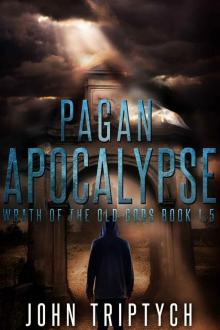 Pagan Apocalypse (Wrath of the Old Gods (Young Adult Series) Book 1)
Pagan Apocalypse (Wrath of the Old Gods (Young Adult Series) Book 1)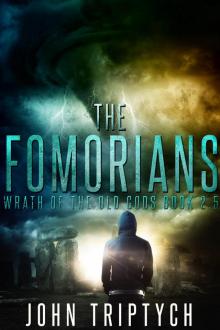 The Fomorians
The Fomorians Nepenthe Rising
Nepenthe Rising Virago One: A Hard Science Fiction Technothriller (Ace of Space Book 2)
Virago One: A Hard Science Fiction Technothriller (Ace of Space Book 2)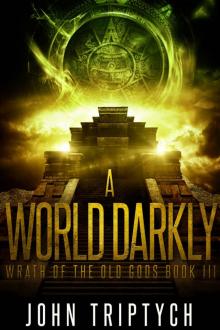 A World Darkly (Wrath of the Old Gods Book 3)
A World Darkly (Wrath of the Old Gods Book 3) The Glooming (Wrath of the Old Gods Book 1)
The Glooming (Wrath of the Old Gods Book 1) The Piranha Solution: A Hard Science Fiction Technothriller (Ace of Space Book 1)
The Piranha Solution: A Hard Science Fiction Technothriller (Ace of Space Book 1)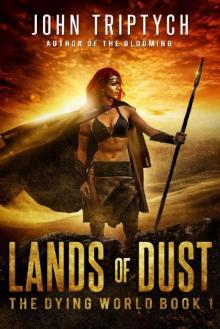 Lands of Dust (The Dying World Book 1)
Lands of Dust (The Dying World Book 1)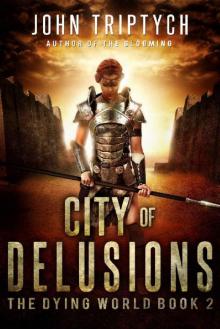 City of Delusions (The Dying World Book 2)
City of Delusions (The Dying World Book 2)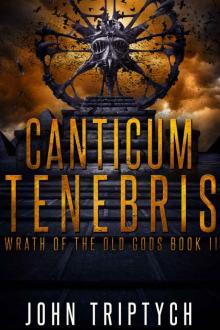 Canticum Tenebris (Wrath of the Old Gods Book 2)
Canticum Tenebris (Wrath of the Old Gods Book 2) Shards of Eternity
Shards of Eternity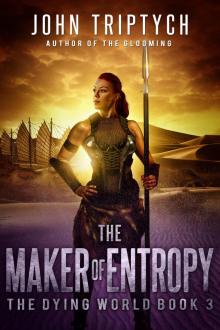 The Maker of Entropy
The Maker of Entropy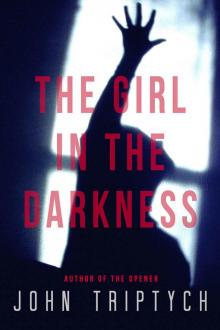 The Girl in the Darkness
The Girl in the Darkness Nepenthe Rising (Stars in Shadow Book 1)
Nepenthe Rising (Stars in Shadow Book 1)